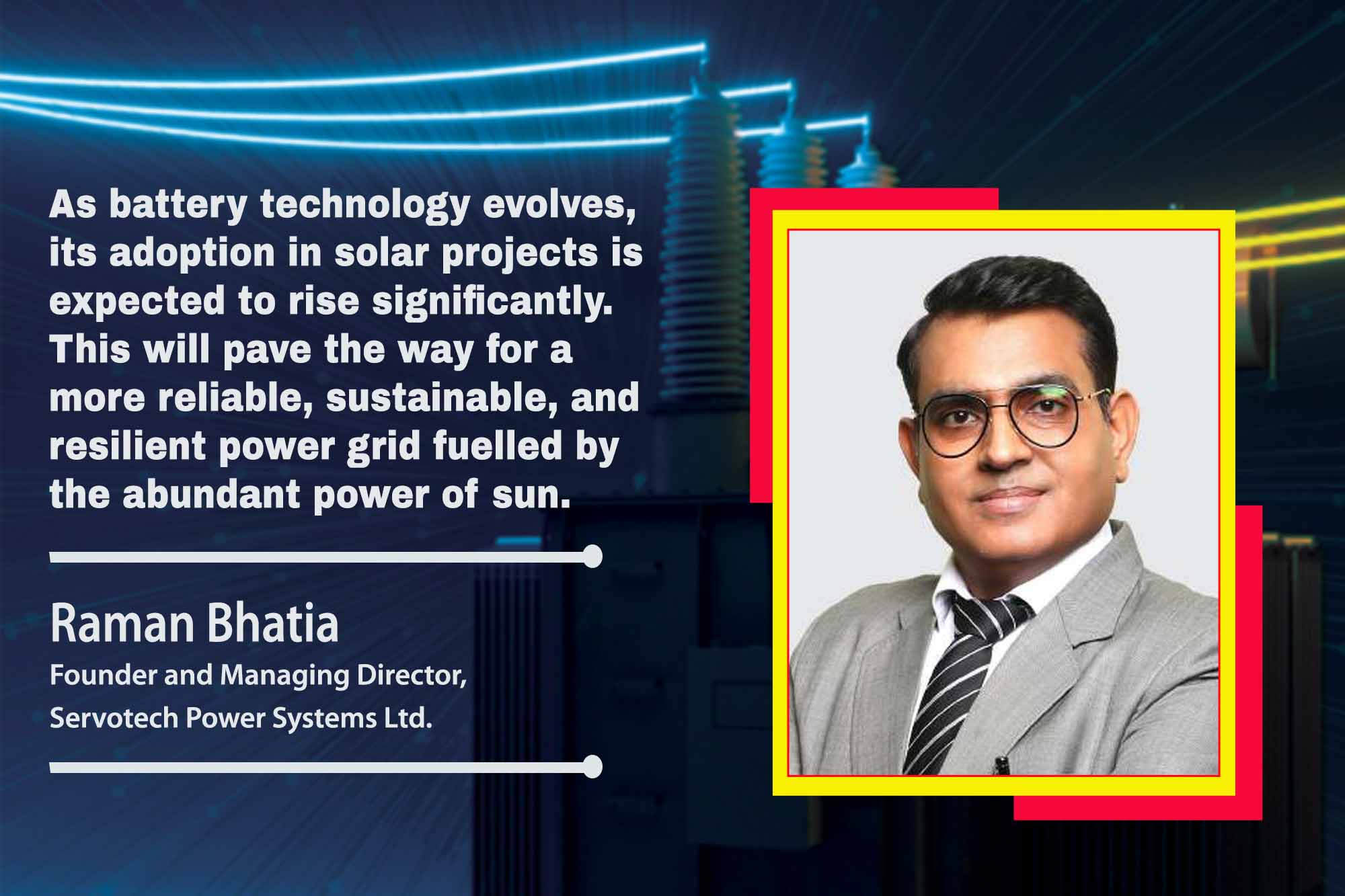State initiatives and innovations propel the solar EPC market
By EPR Magazine Editorial April 24, 2024 6:34 pm IST
By EPR Magazine Editorial April 24, 2024 6:34 pm IST

As battery technology evolves, its adoption in solar projects is expected to rise significantly. This will pave the way for a more reliable, sustainable, and resilient power grid fuelled by the abundant power of sun.
The Solar EPC market in India is expanding rapidly due to government initiatives, technological advancements, and the growing demand for sustainable energy solutions. Strategic planning can help companies tap into this thriving sector. Raman Bhatia explains the latest trends in an interview with EPR Magazine.
What are some emerging trends in the solar EPC industry?
The Solar Engineering, Procurement and Construction (EPC) market is witnessing robust growth, propelled by increasing consumer demand for eco-friendly products and technological advancements like AI and blockchain. Government’s focus on utility-scale solar projects and the rise of floating solar power plants are prominent trends. Improved panel efficiency and energy storage systems further boost market expansion. Projections indicate sustained growth until 2031, driven by renewable energy focus and technological
innovations. This underscores the market’s steady evolution and pivotal role in transitioning to sustainable energy solutions.
Can you outline some of the schemes like the National Solar Mission (NSM) launched by the government to encourage solar power generation in the country?
The National Solar Mission (NSM) was a step taken by the Indian government to foster sustainable growth, address energy security challenges and combat climate change with a target of 50% cumulative electric power from non-fossil fuel sources and a 45 % reduction in emission intensity of GDP by 2030. Like NSM, the Indian Government has also launched various schemes to encourage the generation of solar power in the country, like Solar Park Schemes, VGF Schemes, CPSU Schemes, Defence Schemes, Canal bank & Canal top Schemes, Bundling Schemes, Grid Connected Solar Rooftop Scheme etc. to promote the transition towards solar energy.
What strategies are employed by your company to increase efficiency and reduce costs?Our company adopts several strategies to enhance efficiency and maintain a competitive edge. This includes pre-construction optimisation through standardised designs, BIM utilisation for clash detection, and conducting value engineering workshops. In procurement, we prioritise developing strong vendor relationships, collaborate closely, and emphasise local sourcing. During construction, we implement lean principles such as just-in-time inventory management and waste elimination. Leveraging SOPs and digital tools further streamline operations. Additionally, we embrace technology by utilising data analytics and investing in R&D. We prioritise investing in employee training, fostering a culture of continuous improvement, and benchmarking against industry best practices. These strategies collectively contribute to cost reduction and operational efficiency.
How is battery storage integration incorporated into solar projects, and what benefits does it offer?
Battery storage is integrated into solar projects through co-located systems, behind-the-meter (BTM) storage, and front-of-the-meter (FTM) storage. Benefits include increased grid stability, enhanced self-consumption, time-shifting, improved renewables integration, and resilience during outages. This integration ensures a reliable, sustainable, and resilient power grid, paving the way for a future powered by clean energy. As battery technology evolves, its adoption in solar projects is expected to rise significantly. This will pave the way for a more reliable, sustainable, and resilient power grid fuelled by the abundant power of the sun.
What strategies do you apply to tap the Solar EPC market in India?
The Indian solar EPC market is a booming sector with immense potential, and with the right strategies, you can tap the solar EPC market in India. Identify niche markets such as rooftop solar, utility-scale farms, or industrial solutions. Analyse competition, establish strong vendor relationships and prioritise quality and safety while complying with regulations like MNRE’s. Offer competitive pricing and financing options for accessibility. Focus on customer service, offering warranties and maintenance plans. Stay updated on solar technologies, integrating advancements for cutting-edge solutions. Innovate with new business models like subscription-based solar or combining with other renewable sources. Target regions with high solar potential and build industry relationships for collaboration.
Spokesperson: Raman Bhatia, Founder and Managing Director- Servotech Power Systems Ltd.
We use cookies to personalize your experience. By continuing to visit this website you agree to our Terms & Conditions, Privacy Policy and Cookie Policy.